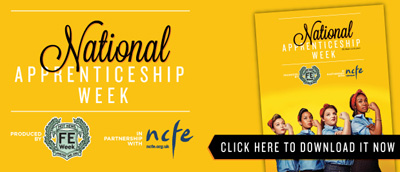The sixth National Apprenticeship Week is a chance to reflect and look forward to the changes that will drive up the quality of apprenticeships, says Matthew Hancock
Apprenticeships are booming with more than a million starting since the last election. But there is much more to tell in this success story.
As well as ensuring that each apprenticeship is for a minimum of a year and that English and maths are a priority, we are also offering apprenticeships as an alternative to university into professions such as insurance, accounting, and law. The development of these Higher Apprenticeships is one of my personal priorities.
Doug Richard’s review last year will play an important part in safeguarding the programme’s quality and I will shortly publish details of how we plan to take his recommendations forward.
The figures show that people who complete an apprenticeship at intermediate level – GCSE-equivalent – can expect to earn £74,000 more over their lifetime than people with similar backgrounds and qualifications. With an apprenticeship at advanced level, the rewards become even greater.
A report by the Association of Accounting Technicians shows that while 44 per cent of 2012/13 graduates are predicted to be either underemployed or unemployed six months after leaving full-time education, those with vocational qualifications such as Higher Apprenticeships can earn an estimated £150,000 more over their lifetime than someone with no qualifications — comparable to the earnings advantage a graduate could expect.
We must make it even easier for businesses to take on apprentices.”
Employers of apprentices also have an interesting story to tell. Nearly three-quarters of them find that having apprentices improves productivity. And around two-thirds say that they improve staff morale and retention. On average, they make back the money they spend on an apprentice’s salary and other costs within two years.
The rest of us might do well to reflect that every pound of taxpayer’s money spent on apprenticeships has been variously estimated to generate between £18 and £28 of benefit to the economy, helping to create new jobs, new business and new growth.
In the light of facts like these, I quickly learned that my job was not to sell apprenticeships, but to ensure that they met the widest possible range of needs.
At the other end of the scale, we are all aware of the dangers of high youth unemployment. That is why we are establishing a new programme of traineeships to help young people aged 16-24 to develop the skills they need to secure and succeed in employment, including through apprenticeships. I expect the first places on the new programme to be available from this September.
Finally, we must make it even easier for businesses to take on apprentices. I started out in a small family business, so know how daunting this can be. The Apprenticeship Grant for Employers provides £1,500 per apprentice to support smaller employers, who haven’t taken on an apprentice in the past 12 months, to take on up to 10 apprentices aged 16-24. The grant, now available until the end of this year, will encourage even more employers to find out how much apprentices can strengthen their business.
I hope, too, that many people will find out about the scheme this week. Events are being held in all parts of the country and are well worth seeking out.
Matthew Hancock is FE Minister
—————————————————————————————–
This article was published in a special 16 page National Apprenticeship Week 2013 supplement (click on image below to download 15mb PDF


